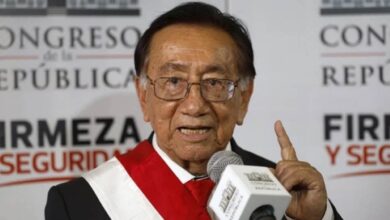The price of being a social leader in Colombia
NGOs’ figures show that approximately 130 social leaders have been killed

On December 14th, a disturbing image was seen in the Colombian media: around 20 people dressed in white wearing a white mask. They were not terrorists, illegal groups or members of a group. They were social leaders of Bajo Atrato and Urabá denouncing the death threats that weigh on their lives. They decided to cover their faces so that those who persecute them cannot recognize them.
“For defending the possibility of a decent life we are living in violence, please we need you to listen to us, until when are we going to be like this?” said one of the leaders.
The group of people traveled to Bogotá to denounce that the violence has come to silence even the local authorities and demand to the Government to take actions that allow them to return to their territories in tranquility. They came to the city to denounce that if the government does not act and maintains its current discourse, none of them has its life guaranteed: “They are killing us one by one. The Government misrepresents the situation, says that it is about adjustments of accounts, but what accounts do we have with them?” assures another masked leader.
Why social leaders are being killed?
In their allegations, the social leaders assure that not only the armed groups, specifically the denominated Autodefensas Gaitanistas de Colombia (AGC), are persecuting them. Also, according to their declaration, “palm, cattle ranchers, miners and banana businessmen” are harassing them.
The reason for the dispute is the same that has tormented the country for centuries: territory. Many of them have been trying to return to their lands for more than 20 years and this ongoing struggle has put them in the spotlight of many people who seek to continue having control over this land.
According to the Ombudsman’s Office, most of the murders are against people who developed community organization or guard rural area rights, while many others were leaders of villages or indigenous communities. Similarly, Ombudsman shows that the attacks against the leaders are related to the defense of ethnic territories, opposition to the expansion of mining and agro-industry, and complaints about the land problem.
What is going on?
In the country, the situation could not be more devastating. The leaders are killed in the north -like Hernán Bedoya at the beginning of December-, in the south -as José Jair Cortés-, in the center -like Liliana Astrid Ramírez-,) and in the northwest -as the case of Liliana Patricia Cataño-. They are not safe anywhere.
It has not even been possible to consolidate a figure that accounts for the real situation of social leaders. The UNHCR claims that this year, 80 social leaders have been murdered. Indepaz, a Colombian NGO, claims that there are 137 cases; the program “Somos Defensores” points to 90 cases; Marcha Patriotica, a Colombian political group, assures that there are 127. Even more incredible is the numbers handled by the Government which are quite different. According to the Ministry of Defense, only 54 cases have been registered.
Additionally, there are multiple complaints to the protection measures granted by the State: a cell phone with minutes, a bulletproof vest and an escort. A cell phone that often does not have signal because in their territories there is none. A bulletproof vest that isn’t within reach when they’re attacked in the middle of the night. Some escorts that have to sleep in the nearest towns, far from whose they are supposed to protect.
“They have made threats directly to us and say that if we are one more day in the land they do not respond for the life of any of us”, declared one of the leaders to the Contagio Radio portal.
What does the Government say?
For all the above, the leaders requested a meeting with the Interior Minister, Guillermo Rivera, and Vice President Óscar Naranjo. Their demand is that they have to give them a clear solution for the threats, in addition to expediting the judicial processes that allow them to recover their lands from the entrepreneurs.
In fact, high impunity is another factor that favors violence. According to Somos Defensores, there is a level of impunity of 87% in the 458 crimes against human rights defenders that have occurred between 2009 and 2016. From these crimes, there are only 28 convictions, 26 in trial and 27 in charge of charges.
Furthermore, Defense Minister Luis Carlos Villegas, in an interview with Noticias Uno, insists that these killings are not systematic and that “the vast majority of murders of leaders are the result of a borderline issue, an issue of skirts (problems with women), of vindication, of fights for illicit rents “. He also assured that “I would be the first to denounce the systematicity. If I had any information that there is an organization dedicated to assassinating leaders, I would say so. “
Moreover, the spokesman of the United Nations Agency for Refugees, UNHCR, William Spindler, said that “we saw that it was a recurring problem, we investigated and confirmed that yes, there is a pattern (of murders). In many cases, criminal activity has increased in the last case because the vacuum left by the demobilization of FARC has not been filled by the State. “
Also, the Peace and Reconciliation Foundation ensures that although there is no standard in those responsible, there are patterns in the victims: leaders associated with activities against illicit economies, environmental protection, land restitution processes or reparation of victims.
The situation is not only worrying, it is hopeless. Every week, someone else joins the list of deaths and the defenders are at a crossroads from which it is difficult to leave. It becomes easier to cover their faces than to resume their lives. In addition, the implications of this violent and dramatic situation are key and worrisome while Government seeks to implement the processes agreed with FARC.
Instead of guaranteeing the conditions of security and well-being to rural populations or to leaders seeking a dignified life, the State turns its back on them and stumbles in their incapacity. On the other hand, the new armed actors and the groups of power take advantage of this negligence to sink these lands in the same fear and forgetfulness that their inhabitants dreamed of overcoming.
LatinAmerican Post | Dayana Matínez
Copy edited by Marcela Peñaloza





